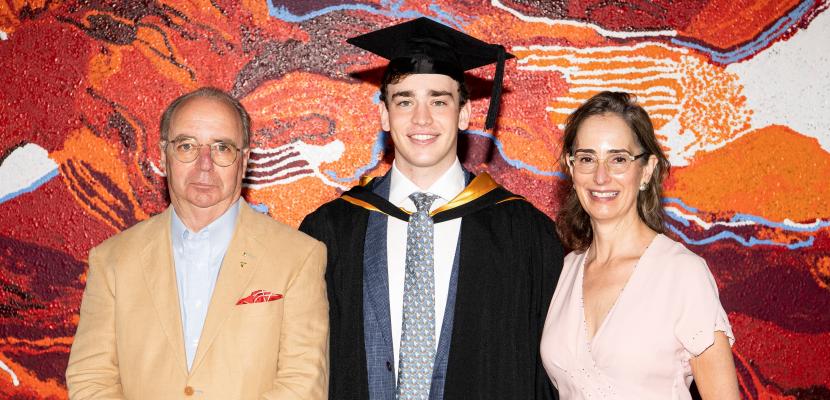
Renowned Australian artist Tim Storrier’s self-portrait, The Histrionic Wayfarer (after Bosch), was a controversial choice when he won the Archibald Prize in 2012.
Instead of a face or body, the portrait features an empty suit of explorer’s clothes carrying the tools of the artists’ trade on his back.
Its title refers to a 1510 painting by Hieronymus Bosch called The Wayfarer in which a figure - often interpreted as the prodigal son returning - is shown choosing a path.
A life size bronze sculpture of the piece, also created by Storrier, stands on the Bond University campus – a poignant placement given the divergent paths of the artist and his stepson, Bond Commerce graduate Samuel Rosen, one of 515 people to cross the stage during graduation ceremonies in February.
Storrier has been making art for more than 50 years and was the youngest ever winner of the prestigious Sulman Prize aged just 19. But the artist’s life of uncertainty and isolation wasn’t something he wanted for his children.
“It’s a very uncertain thing to attempt to become an artist, financially. It always has been,” says Storrier.
“I have to say that even with astonishing amounts of government money, it always will be.”
Thanks to Storrier’s influence, Samuel chose a different type of risk - the world of business.
“Tim thought there were already too many artists in the world and he wouldn’t want me to do that too. But I’m very happy with my decision,” he says.
Storrier, too, is happy with his life choices. It ‘never occurred to him’ to take a different path, he says.
With two Sulman prizes, an Archibald and the Doug Moran National Portrait Prize under his belt, along with works held in most Australian national and state art institutions, that’s perhaps no surprise.
He has no plans to retire while the urge to create and explore new ideas continues.
“If you succeed (as an artist) there is one great advantage,” he says.
“I’m now 73 and most of my generation has retired, whereas an artist tends not to retire, so you have that spiritual companionship of continuing to work as long as you can.
“I’m very fortunate in that I seem to still be able to come up with fresh ideas and keep myself amused. One has to try and guard against repetitive patterns.”
Storrier likens his creative process to ‘writing a rather ludicrous novel – as in a novel there are characters and backgrounds and different angles’.
Although famed for his landscape interpretations, Storrier says his ideas don’t tend to come from his surrounding environment. A coming change of scenery with the purchase of a home near Bundaberg in Queensland is unlikely to spark any shift in his work.
“I work entirely from memory and imagination - it’s never site-specific,” he says.
“But then, you never know.”
The artist and his wife Janet will be commuting regularly from their current home in Bowral, New South Wales to spend time with Samuel and his partner, also a Bond graduate, who live and work in Brisbane.
Storrier is typically forthright about why the pair were snapped up by leading organisations upon graduating from Bond.
“One thing I found attractive (about Bond) is that students in Australia always seem to be on holiday. Bond reduces the amount of wasted time,” he says.
“It also has a very good reputation of producing excellent young people capable of being employed and it’s sad to say that not all university graduates these days are capable of being employed, in my opinion.”

